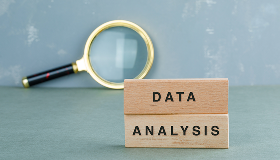In today's digital age, data analytics has become a critical component of business success. As businesses continue to grow and thrive, it's essential to harness the power of data analytics to drive informed decision-making, improve operational efficiency, and enhance customer engagement. With the increasing availability of affordable and accessible data analytics tools and technologies, businesses can now take charge of their data and unlock its full potential.
The First Rule of Data Analytics: Focus on Business Outcomes
According to Andrew Hood, Founder and Managing Director of Edinburgh-based analytics consultancy Lynchpin, "The first rule of data analytics is to step back from the data." This may seem counterintuitive, but it's essential to start with clear business outcomes in mind, rather than getting bogged down in the data itself.
"When we start working with a new client, we always ask them what they want to achieve," says Andrew. “What are their business goals? What do they want to accomplish? Once we understand their goals, we can start thinking about how data analytics can help them achieve those goals.”
The Need for Businesses to Take Charge of Their Data
Indian businesses, particularly small and medium-sized enterprises (SMEs), have a unique opportunity to leverage data analytics to drive growth and competitiveness. With the increasing availability of affordable and accessible data analytics tools and technologies, Indian businesses can now take charge of their data and unlock its full potential.
"Indian businesses have traditionally been very good at collecting data, but not always as good at using it to drive business decisions," says Andrew. “But with the increasing availability of data analytics tools and technologies, Indian businesses can now unlock the full potential of their data and drive growth, competitiveness, and success.”
Two Primary Needs for Businesses
According to Andrew Hood, there are two primary needs for Indian businesses to take charge of their data:
1. Understanding what's working and what's not: Indian businesses need to analyze their data to identify areas of strength and weakness and make informed decisions to drive growth and improvement.
"For example, let's say you're a retailer with multiple stores across India," says Andrew. “You can use data analytics to understand which stores are performing well and which ones need improvement. You can also use data analytics to understand which products are selling well and which ones are not and make informed decisions about inventory management and supply chain optimization.”
2. Understanding customers: Indian businesses need to use data analytics to gain a deeper understanding of their customers' needs, preferences, and behaviors and tailor their products and services accordingly.
"For example, let's say you're an e-commerce company with a large customer base in India," says Andrew. “You can use data analytics to understand your customers' buying behavior, their preferences, and their needs. You can then use that information to personalize their shopping experience, offer them targeted promotions and recommendations, and improve their overall satisfaction with your brand.”
Six Key Takeaways for Businesses
1. Specify outcomes from the beginning: Identify clear business outcomes and use data analytics to drive towards those outcomes.
"It's essential to start with clear business outcomes in mind," says Andrew. “What do you want to achieve? What are your business goals? Once you understand your goals, you can start thinking about how data analytics can help you achieve those goals.”
2. Become familiar with data analytics tools and technologies: Take advantage of the many affordable and accessible data analytics tools and technologies available in the market.
"There are many data analytics tools and technologies available in the market today," says Andrew. “From Google Analytics to Tableau, from Excel to Python, there are many options available. Indian businesses should take advantage of these tools and technologies to unlock the full potential of their data.”
3. Know where your data lies: Identify the various sources of data within your business, including online transactions, social media, email campaigns, and supplier data.
"Indian businesses have a lot of data at their disposal," says Andrew. “From online transactions to social media, from email campaigns to supplier data, there are many sources of data within a business. Indian businesses should identify these sources of data and use them to drive informed decision-making.”
4. Don't bite off more than you can chew: Focus on one or two data analytics techniques and do them well, rather than trying to analyze everything at once.
"It's essential to focus on one or two data analytics techniques and do them well, rather than trying to analyze everything at once," says Andrew. “Indian businesses should prioritize their data analytics efforts and focus on the most important metrics and KPIs.”
5. SMEs have a unique advantage: Indian SMEs have the agility and flexibility to quickly adapt to changing market conditions and customer needs, making them well-suited to leveraging data analytics.
"Indian SMEs have a unique advantage when it comes to data analytics," says Andrew. “They have the agility and flexibility to quickly adapt to changing market conditions and customer needs, making them well-suited to leveraging data analytics.”
6. Seize the opportunity: Indian businesses must seize the opportunity to leverage data analytics and drive growth, competitiveness, and success in the digital age.
"Indian businesses must seize the opportunity to leverage data analytics and drive growth, competitiveness, and success in the digital age," says Andrew. “With the increasing availability of affordable and accessible data analytics tools and technologies, Indian businesses can now take charge of their data and unlock its full potential.”
Conclusion
In conclusion, data analytics is a critical component of business success in today






